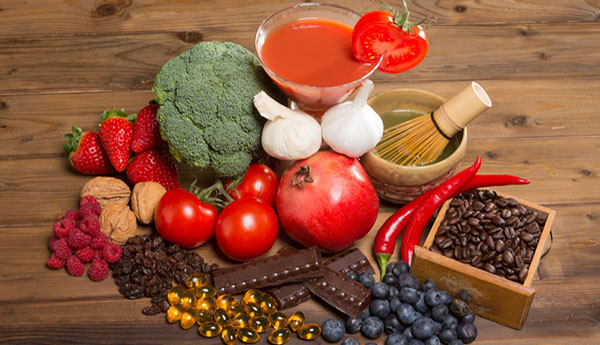By Allan Bucka Jones
Pride Health Columnist
One major source of the many illnesses and diseases are free radicals.
They are generated as cells use oxygen to break down food for energy, and they can cause cell damage by attaching to other molecules and prompting cells to grow abnormally or by interfering with normal cell functions, including those in the brain.
Free radicals are a natural by-product of the body’s metabolism, but in most cases, naturally occurring antioxidants stabilize them and keep the damage to a minimum.
When that balance is disturbed, and anything from exposure to pollutants to cigarette smoke to the things you eat, can shift this equilibrium. The production of free radicals may outrun the body’s ability to control them. That is why antioxidants is now a popular weapon in the fight for well-being. The reasoning is, if the body needs more antioxidants, they can be supplied as fruits, vegetables or supplements.
Adequate intakes of beta-carotene and vitamin C have been linked in some studies to a reduced risk of cancers of the esophagus, stomach, pancreas, lung, colon, rectum, prostate, breast, ovaries and cervix.
Several studies found that people with low dietary intakes or low blood levels of antioxidants have a higher risk of these cancers.
In the studies that showed protective effects, fruits and vegetables, not supplements, were the key sources of these nutrients. In fact, studies with supplements prove how difficult it is to distinguish between the effect of a food and the effect of one of its many components.
At best, studies of antioxidant supplements have produced disappointing results, and a few have raised the possibility that high doses of a single antioxidant may be harmful.
For example, the Women’s Health Study found that vitamin E supplements provide no protection against cancer, and two other studies found that beta-carotene supplements increase the risk of lung cancer in smokers.
Some researchers hypothesize that the large amounts of beta-carotene in the supplements increased lung cancer risk because the beta-carotene blocked the absorption of other carotenoids that are protective against cancer.
These studies should not stop you from eating foods that supply beta-carotene, which is only one of the hundreds of carotenoids found in foods. In fact, it is virtually impossible to get too much of any nutrient from non-fortified foods alone.
Other carotenoids may protect against cancer. For example, some studies suggest that tomatoes and tomato-based products (such as tomato sauce, tomato juice and ketchup) are linked to a reduced risk of prostate cancer. Tomatoes are a leading source of lycopene, a carotenoid that gives tomatoes their red color.
Additional studies are needed to firmly establish whether lycopene, alone or in combination with other dietary components, reduces prostate cancer risk.
The greatest protective effect of tomatoes appears to come from cooked tomato products, such as tomato sauce, since cooking concentrates the lycopene content and increases its absorption in the body. Watermelon is another good source of lycopene.
Selenium is a mineral associated with a reduced risk of various cancers. Selenium acts indirectly as an antioxidant; it is an essential component of enzymes that inactivate free radicals.
Research indicates that people with a high intake of this mineral and those who live in areas where the selenium content of the soil is high have a lower risk of lung, colon and other cancers.
Selenium is found in Brazil nuts, sunflower seeds, fish, turkey, wheat germ and other grains, fruits and vegetables.
The amount of selenium in plant foods depends on the amount of the mineral in the soil where the food is grown. Preliminary studies suggesting that selenium supplements may reduce cancer risk are far from conclusive.
In fact, one study found that men with naturally high levels of selenium doubled their risk of developing high-grade prostate cancer by taking selenium supplements. Further research is necessary to clarify the benefits and risks of this supplement.
The evidence is indicating that fruits and vegetables may be more efficacious as antioxidants than supplement. Do some research or see a naturopathic doctor, to guide you in selecting the best foods to consume.
It all comes down to creating an environment for the body to heal itself naturally. It can.
Allan Bucka Jones is a Health Promoter and Broadcaster. You can contact Allan Bucka Jones at allan@jonesandjones.ca.
 Pride News Canada's Leader In African Canadian & Caribbean News, Views & Lifestyle
Pride News Canada's Leader In African Canadian & Caribbean News, Views & Lifestyle





